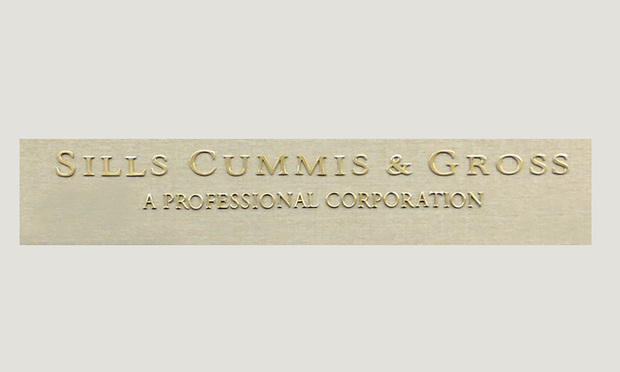Appeals Court Nixes Mandatory Arbitration in Sills Cummis Malpractice Lawsuit
A Sills Cummis arbitration agreement violated the Rules of Professional Conduct and is unenforceable because it referenced 33 pages of JAMS arbitration rules, yet the client was never given a copy of those rules, the appeals court said.
August 23, 2019 at 05:25 PM
5 minute read

A New Jersey appeals court has overturned an order compelling arbitration of a malpractice suit brought by a former client against Sills Cummis & Gross in Newark.
A Sills Cummis arbitration agreement violated the Rules of Professional Conduct and is unenforceable because it referenced 33 pages of JAMS arbitration rules, yet the client was never given a copy of those rules, the appeals court said in Delaney v. Dickey on Friday.
A trial court upheld the arbitration clause and dismissed malpractice claims against Sills Cummis and attorney Trent Dickey. Friday's ruling reverses that decision and remands the case for further proceedings.
The ruling stems from a September 2015 retainer agreement signed by Brian Delaney, who sought representation from Sills Cummis in connection with a business dispute with his partners in a limited liability company. Toward the end of the three-page retainer was an arbitration clause, which said any disputes would be submitted to an arbitrator whose ruling would be final. The agreement said any disputes arising from the retainer "will be conducted pursuant to the JAMS/Endispute Arbitration Rules and Procedures (the 'JAMS Rules') then in effect," and listed a website where those rules could be found.
Delaney signed the retainer and arbitration clause. He intended for Dickey to represent him, but Dickey was not present when the retainer was signed. Another Sills Cummis partner, Thomas Della Croce, attended and signed in place of Dickey.
Ten months later, Delaney terminated Sills Cummis and refused to pay an outstanding bill for more than $400,000. Sills Cummis then initiated arbitration with JAMS in accordance with the retainer agreement. The parties sought to mediate their fee dispute before engaging in discovery in anticipation of a fee arbitration with JAMS.
Before the JAMS arbitration started, Delaney filed a malpractice suit against Sills Cummis and Dickey. Delaney claimed Dickey failed to conduct certain discovery, failed to obtain documents that would have demonstrated his business associates' alleged mismanagement of their limited liability companies, and failed to hire experts to value one of the companies and analyze the associates' business practices.
Judge Patrick Bartels, in Essex County Superior Court, said the malpractice claim and fee dispute were subject to the JAMS arbitration.
On appeal, Judges Carmen Alvarez, William Nugent and Susan Reisner said the question before the court was whether the Sills Cummis retainer agreement violates rules governing the attorney-client relationship, and if that violation means the retainer agreement is invalid.
Delaney said Sills Cummis and Dickey violated RPC 1.4(c)'s requirement that a lawyer "shall explain a matter to the extent reasonably necessary to permit the client to make informed decisions regarding the representation."
The appeals court agreed, citing case law holding that RPC 1.4(c) requires that "the potential effect of an agreement to arbitrate must be clear to the client to be binding upon him" and that "full and complete disclosure of all charges which may be imposed upon the client is also necessitated by RPC 1.4(c)."
Delaney also claimed Sills Cummis and Dickey violated RPC 7.1(a), which says a lawyer may not "make false or misleading communications about the lawyer, the lawyer's services, or any matter in which the lawyer has or seeks a professional involvement."
The appeals court said an attorney need not explain the JAMS rules to a prospective client, but "the thirty-three pages of JAMS rules should at least be presented to clients with the retainer agreement." The mere number of rules, as well as their complexity to a layperson, could cause the potential client to ask questions about the rules or seek advice elsewhere before signing a retainer agreement, the court said.
"We conclude that because Sills gave plaintiff no explanation about the retainer agreement's or arbitration provision's terms, did not provide plaintiff with the JAMS rules, provided no explanation about the JAMS rules, and watched plaintiff sign the agreement knowing he had not assented to the JAMS rules, this otherwise enforceable agreement runs afoul of two of the ethical rules governing the attorney-client relationship. Accordingly, we find the agreement invalid," the panel said.
Richard Epstein of Sills Cummis, who represents the firm and Dickey, said he will ask the state Supreme Court to hear the case.
Epstein said the firm was pleased that the Appellate Division rejected the plaintiff's argument that arbitration agreements in attorney-client engagement letters should be held per se invalid.
"More guidance is needed, especially in light of New Jersey Supreme Court precedent that arbitration of disputes between attorneys and clients should be encouraged. We intend to ask the New Jersey Supreme Court through a [certification] petition to speak definitively on this issue, because it effects the entire legal profession in our state, as well as the judiciary itself, which, absent these provisions will be flooded with spurious legal malpractice claims," said Epstein, who is the firm's deputy managing partner and general counsel.
Lambertville attorney Glenn Bergenfield, representing Delaney, noted the narrow scope of the panel ruling, and said he welcomed a Supreme Court review of the case. He said if the court takes the case, he will ask it to address whether private arbitration of attorney-client disputes should be held per se invalid. Bergenfield said private arbitration of such matters cuts the Supreme Court out of its role of regulating the legal profession.
"I think this needs to be cleared up. The Appellate Division decision I"m pleased about, but I don't think it clears it up," Bergenfield said.
This content has been archived. It is available through our partners, LexisNexis® and Bloomberg Law.
To view this content, please continue to their sites.
Not a Lexis Subscriber?
Subscribe Now
Not a Bloomberg Law Subscriber?
Subscribe Now
NOT FOR REPRINT
© 2025 ALM Global, LLC, All Rights Reserved. Request academic re-use from www.copyright.com. All other uses, submit a request to [email protected]. For more information visit Asset & Logo Licensing.
You Might Like
View All
Law Firms Look to Gen Z for AI Skills, as 'Data Becomes the Oil of Legal'



Trending Stories
- 1Uber Files RICO Suit Against Plaintiff-Side Firms Alleging Fraudulent Injury Claims
- 2The Law Firm Disrupted: Scrutinizing the Elephant More Than the Mouse
- 3Inherent Diminished Value Damages Unavailable to 3rd-Party Claimants, Court Says
- 4Pa. Defense Firm Sued by Client Over Ex-Eagles Player's $43.5M Med Mal Win
- 5Losses Mount at Morris Manning, but Departing Ex-Chair Stays Bullish About His Old Firm's Future
Who Got The Work
J. Brugh Lower of Gibbons has entered an appearance for industrial equipment supplier Devco Corporation in a pending trademark infringement lawsuit. The suit, accusing the defendant of selling knock-off Graco products, was filed Dec. 18 in New Jersey District Court by Rivkin Radler on behalf of Graco Inc. and Graco Minnesota. The case, assigned to U.S. District Judge Zahid N. Quraishi, is 3:24-cv-11294, Graco Inc. et al v. Devco Corporation.
Who Got The Work
Rebecca Maller-Stein and Kent A. Yalowitz of Arnold & Porter Kaye Scholer have entered their appearances for Hanaco Venture Capital and its executives, Lior Prosor and David Frankel, in a pending securities lawsuit. The action, filed on Dec. 24 in New York Southern District Court by Zell, Aron & Co. on behalf of Goldeneye Advisors, accuses the defendants of negligently and fraudulently managing the plaintiff's $1 million investment. The case, assigned to U.S. District Judge Vernon S. Broderick, is 1:24-cv-09918, Goldeneye Advisors, LLC v. Hanaco Venture Capital, Ltd. et al.
Who Got The Work
Attorneys from A&O Shearman has stepped in as defense counsel for Toronto-Dominion Bank and other defendants in a pending securities class action. The suit, filed Dec. 11 in New York Southern District Court by Bleichmar Fonti & Auld, accuses the defendants of concealing the bank's 'pervasive' deficiencies in regards to its compliance with the Bank Secrecy Act and the quality of its anti-money laundering controls. The case, assigned to U.S. District Judge Arun Subramanian, is 1:24-cv-09445, Gonzalez v. The Toronto-Dominion Bank et al.
Who Got The Work
Crown Castle International, a Pennsylvania company providing shared communications infrastructure, has turned to Luke D. Wolf of Gordon Rees Scully Mansukhani to fend off a pending breach-of-contract lawsuit. The court action, filed Nov. 25 in Michigan Eastern District Court by Hooper Hathaway PC on behalf of The Town Residences LLC, accuses Crown Castle of failing to transfer approximately $30,000 in utility payments from T-Mobile in breach of a roof-top lease and assignment agreement. The case, assigned to U.S. District Judge Susan K. Declercq, is 2:24-cv-13131, The Town Residences LLC v. T-Mobile US, Inc. et al.
Who Got The Work
Wilfred P. Coronato and Daniel M. Schwartz of McCarter & English have stepped in as defense counsel to Electrolux Home Products Inc. in a pending product liability lawsuit. The court action, filed Nov. 26 in New York Eastern District Court by Poulos Lopiccolo PC and Nagel Rice LLP on behalf of David Stern, alleges that the defendant's refrigerators’ drawers and shelving repeatedly break and fall apart within months after purchase. The case, assigned to U.S. District Judge Joan M. Azrack, is 2:24-cv-08204, Stern v. Electrolux Home Products, Inc.
Featured Firms
Law Offices of Gary Martin Hays & Associates, P.C.
(470) 294-1674
Law Offices of Mark E. Salomone
(857) 444-6468
Smith & Hassler
(713) 739-1250






